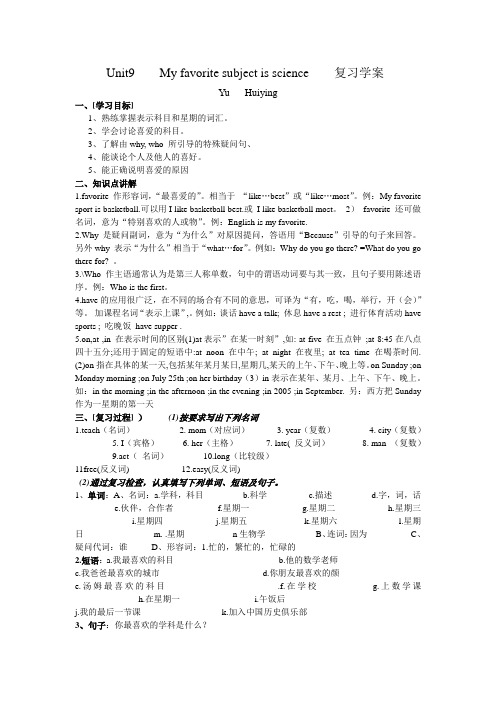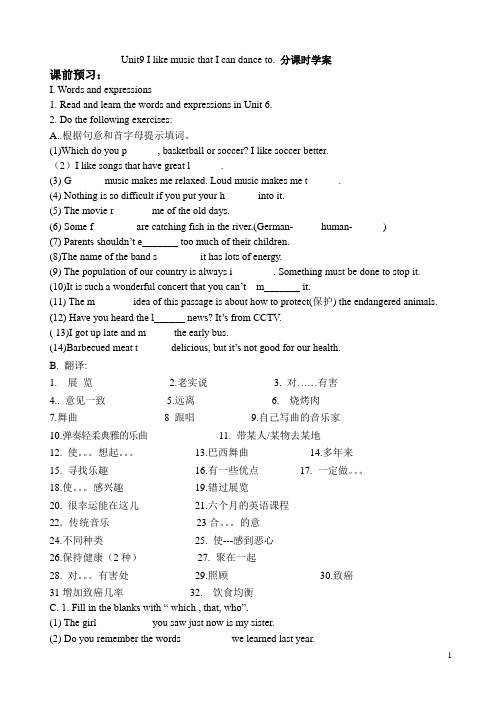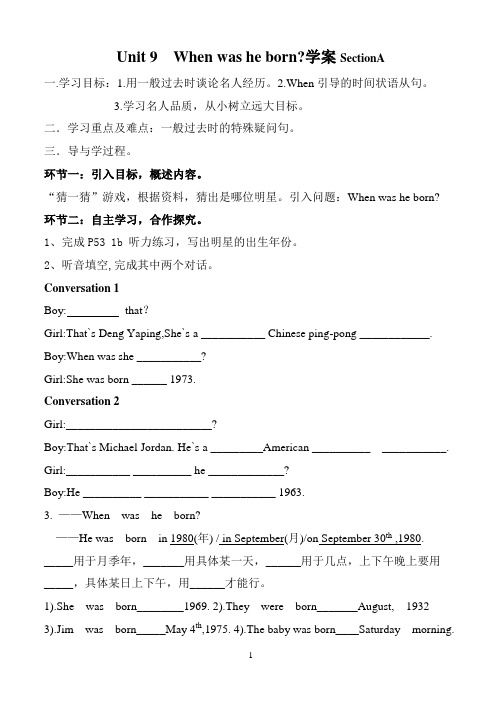最新Unit9学案
- 格式:pdf
- 大小:8.73 KB
- 文档页数:3

Unit9 My favorite subject is science 复习学案Yu Huiying一、[学习目标]1、熟练掌握表示科目和星期的词汇。
2、学会讨论喜爱的科目。
3、了解由why, who 所引导的特殊疑问句、4、能谈论个人及他人的喜好。
5、能正确说明喜爱的原因二、知识点讲解1.favorite 作形容词,“最喜爱的”。
相当于“like…best”或“like…most”。
例:My favorite sport is basketball.可以用I like basketball best.或I like basketball most。
2)favorite 还可做名词,意为“特别喜欢的人或物”。
例:English is my favorite.2.Why 是疑问副词,意为“为什么”对原因提问,答语用“Because”引导的句子来回答。
另外why 表示“为什么”相当于“what…for”。
例如:Why do you go there? =What do you go there for? 。
3.\Who作主语通常认为是第三人称单数,句中的谓语动词要与其一致,且句子要用陈述语序。
例:Who is the first。
4.have的应用很广泛,在不同的场合有不同的意思,可译为“有,吃,喝,举行,开(会)”等。
加课程名词“表示上课”,。
例如:谈话have a talk; 休息have a rest ; 进行体育活动have sports ; 吃晚饭have supper .5.on,at ,in 在表示时间的区别(1)at表示”在某一时刻”,如: at five 在五点钟;at 8:45在八点四十五分;还用于固定的短语中:at noon 在中午; at night 在夜里; at tea time在喝茶时间.(2)on指在具体的某一天,包括某年某月某日,星期几,某天的上午、下午、晚上等。

Unit9 I like music that I can dance to.分课时学案课前预习:I. Words and expressions1. Read and learn the words and expressions in Unit 6.2. Do the following exercises:A..根据句意和首字母提示填词。
(1)Which do you p______, basketball or soccer? I like soccer better.(2)I like songs that have great l______.(3) G______ music makes me relaxed. Loud music makes me t______.(4) Nothing is so difficult if you put your h______ into it.(5) The movie r_______ me of the old days.(6) Some f________ are catching fish in the river.(German-_____ human-______)(7) Parents shouldn’t e_______ too much of their children.(8)The name of the band s________ it has lots of energy.(9) The population of our country is always i________. Something must be done to stop it.(10)It is such a wonderf ul concert that you can’t m_______ it.(11) The m_______ idea of this passage is about how to protect(保护) the endangered animals.(12) Have you heard the l______ news? It’s from CCTV.( 13)I got up late and m_____ the early bus.(14)Barbecued meat t______ delicious, but it’s not good for our health.B. 翻译:1. 展览2.老实说3. 对……有害4.. 意见一致5.远离6. 烧烤肉7.舞曲8 跟唱9.自己写曲的音乐家10.弹奏轻柔典雅的乐曲11. 带某人/某物去某地12. 使。

导学案第一课时Section A (1a~1c)【学习目标】1.教会学生掌握单词prefer,Australian,electronic,suppose,smooth,spare,director,case,war。
2.指导学生仔细聆听谈论自己喜欢的音乐的对话;学会用定语从句谈论自己的喜好。
3.引导学生通过开展小组学习活动,培养协作意识;学会谈论自己喜欢的音乐,培养正确的审美情趣。
【学习重点】重点单词:prefer,Australian,electronic,suppose,smooth,spare,director,case,war【学习难点】通过交流表达和听力训练,引入各种学习方法和策略来学习定语从句。
情景导入生成问题T:Do you love music? Yeah,music is also my favorite.It makes my life more colorful.You know,thereare different kinds of music in the world.自学互研生成能力一.I can write.(我会写)翻译下列词语:(1)great lyrics (2) 跟着歌唱(4)in that case (3) too loud(5)随之跳舞(6) full of energy二、I can practice.(我会练)1.用适当的关系词填空。
(1)Carmen likes musicians play different kinds of music.(2)Carmen likes electronic music is loud.(3)Xu Fei prefers musicians write their own songs.(4)I prefer movies give me something to think about.(5)The subject ________I like best is English.(6)The man ________teaches us English is Mr Black.(7)He likes stories _______are sad.(8)The woman ______is the most important in my life is my mother.2. 单项选择()1. —Can you dance______the music?—Yes, I can. It’s easy.A. withB. inC. atD. to()2. —How wonderful the music is! Let’s try to sing along ______it.—That sounds good.A.toB. withC. forD. On()3 .Everyone ______has been to Shanghai says it is a modern city.A. whyB. whoseC. whoD. which()4. Lucy loves singers______are creative and energetic.A. whichB. whoC. whomD. What()5.The action movie______I saw last week is really exciting.A. whenB. whoC. thatD. What6. I like friends ______are friendly and out-going.A. whoseB. whatC. whoD. Which3.把简单句改为定语从句。

Unit 9 When was he born?学案SectionA一.学习目标:1.用一般过去时谈论名人经历。
2.When引导的时间状语从句。
3.学习名人品质,从小树立远大目标。
二.学习重点及难点:一般过去时的特殊疑问句。
三.导与学过程。
环节一:引入目标,概述内容。
“猜一猜”游戏,根据资料,猜出是哪位明星。
引入问题:When was he born? 环节二:自主学习,合作探究。
1、完成P53 1b 听力练习,写出明星的出生年份。
2、听音填空,完成其中两个对话。
Conversation 1Boy: that?Girl:That`s Deng Yaping,She`s a ___________ Chinese ping-pong ____________. Boy:When was she ___________?Girl:She was born ______ 1973.Conversation 2Girl:_________________________?Boy:That`s Michael Jordan. He`s a _________American __________ ___________. Girl:___________ __________ he _____________?Boy:He __________ ___________ ___________ 1963.3. ——When was he born?——He was born in 1980(年) / in September(月)/on September 30th ,1980._____用于月季年,_______用具体某一天,______用于几点,上下午晚上要用_____,具体某日上下午,用______才能行。
1).She was born________1969. 2).They were born_______August, 1932 3).Jim was born_____May 4th,1975. 4).The baby was born____Saturday morning.4.预习3a翻译短语.太…而不能…___________例如______________开始打高尔夫_______________巴西足球运动员_____________电影明星___________表演京剧______________中国体操运动员________________金牌________世界冠军__________________环节三:展示交流,点拨释疑。

Unit9 My favorite subject is science Section A 2d-3c【教师寄语】:It is difficulties that show what men are. 困境方能见人品。
【学习目标】知识能力目标:1. 识记并能熟练运用新词汇、短语;2. 巩固就所喜欢的科目这一话题进行问答交流;3. 熟练掌握用what, who, why引导的特殊疑问句提问题并能正确回答。
【导学过程2d】温故互查:根据首字母提示补全单词。
1. Green and red are my f__________ colors.2. W_________ are you late for school?3. I don’t like math b__________it’s very difficult.4. I think geography is interesting, but art is b___________.5. This question is easy but that one is d____________.自主探究一、小组内预习本课时新单词。
二、略读2d,回答下列问题:1.What’s Bob’s favorite subject?___________________________________________2. Is Frank’s favorite subject history? Why?___________________________________________3. What’s Frank’s favorit e day?___________________________________________三、细读2d, 找出下列短语及句子并在书上做标记:1.上体育和历史课___________________2.我最喜欢的学科3. 体育老师___________________4. 和我们玩游戏5.你最喜欢的一天6. 第二天7.今天过得如何?? 8. 那太好了!______________________!9.的确如此。

Unit 9 I like music that I can dance to.Part One (Section A 1a ---- 2d)一、课前自学(3min)1. 完成课本第65页1a的练习。
2. 翻译完成下列短语。
跟着唱美妙的歌词不同种类的音乐安静舒缓的歌电子音乐悦耳的音乐在一周的工作后既然那样思考空闲时间二、探究、展示(25min)1.要求学生翻开课本P65,迅速阅读1a部分的内容。
并按要求完成课本上相应的任务。
2.核对答案,先要求全班一起给出答案并检查讨论。
然后要求2-3名同学就“I like music that ”给出自己的答案并完成课本上1b的听力任务。
4.要求学生听第二遍录音,并逐句进行跟读。
5.完成教材1c的任务,要求学生模仿听力内容,使用“—What kind of music do you like?—I like music that …”进行对话练习。
并邀请2-3对同学当堂进行演示。
6.要求学生翻开课本P66。
要求学生迅速捕捉图片和文字信息,然后为他们播放第一遍录音,完成2a,2b的听力任务。
7.要求学生听第二遍录音,并逐句进行跟读,教师应作必要的听力和朗读指导。
8.两人一组大声朗读听力材料。
(1分钟)9.播放2d的对话录音,让学生跟读,模仿并理解大意。
然后让学生分角色朗读并表演2d的对话。
三、点拨(7min)定语从句:1. 定义:在复合句中,修饰某一名词或代词的从句叫定语从句。
定语从句通常置于它修饰的名词或代词之后,被修饰的名词或代词叫先行词。
2. 连词:引导定语从句的连词分为两类,关系代词:that, which, who, whom, whose. 关系副词:when, where, why. 连词在句中起连接作用,同时又代替先行词在从句中充当句子成分。
prefer v. 宁愿,更喜欢其用法如下:1.prefer + 名词/动名词I prefer staying at home during the holiday. 假期期间,我比较喜欢待在家里。
Unit 9LearningPart ⅠTopic Talk学习目标话题语境主动学习与学习方法课时词汇approach, concentrate, solve, shame, educate, process, prefer常用短语be curious about, brush up (on)重点句式(1)as...as...和……一样(2)so...that...如此……以至于……单词巧练写准记牢Ⅰ.核心单词练习:请根据所给的词性和词义写出单词1.________vt. 建立;创办2.________adj. 直的;直接的3.________adj. 无知的;愚昧的4.________n. 羞耻,羞愧5.________n. 教育;培养6.________n. 过程;方法7.________n. 方法8.________n. 搭档,同伴9.________adj. 最喜爱的10.________adj. 流利的;流畅的11.________v. 集中;全神贯注12.________n. 比赛,竞赛Ⅱ.常用单词练习:根据句意和所给的首字母或中文提示写出符合句中单词的正确形式1.I won the first prize in the English speech ________ (竞赛) held in our school last year.2.The girl felt herself ________ (无知的) after making that mistake.3.Filled with ________ (羞愧), the boy lowered his head, ready for the punishment from his dad.4.As we all know, every boy and every girl has the right to receive ________ (教育) in our country.5.Almost every woman wants to be a good mother, but there are a lot of unexpected difficulties in the ________ (过程).6.At the meeting they discussed three different a________ to the study of mathematics.7.Let me give you some advice on how to have a healthy relationship with your p________.8.What is your f________ time of the year? Describe it and explain why you likeit.9.The one who can speak f________ English has an advantage over the one who can't.10.Before every interview, he c________ on preparing for it.►第一版块:重点单词1.approach (1)n.方法;途径;接近(2)vt.接近;vi.靠近(教材P50)What is your learning approach to it?你学习这门课程的方法是什么?[合作探究]体会approach的用法和意义Many birds fly south at the approach of winter.冬季来临之时,许多鸟飞向南方。
Unit 9 I like music that I can dance to.成长心语:Nothing is worth living for without music.没有音乐,生命是没有价值的。
第一课时Section A 1a-2c1.根据所给的中文完成句子。
(1). 你喜欢什么类型的歌手?What__________ of ________ do you like?(2). 我喜欢能演奏不同种类音乐的音乐家。
I like musicians _________ can play ________ _________ _______ music.(3). Nancy 更喜欢可以随之跳舞的音乐。
Nancy _________ music_________ she can __________ _________.(4). Tom 喜欢有着优美歌词的音乐。
Tom likes music __________ has_________ ____________.(5).许飞喜爱能唱慢歌的组合。
Xu Fei loves ___________ that can play _______ songs.2.点拨升华。
prefer 的用法。
①prefer 相当于like...better than 比如:Which do you prefer, tea or coffee?②prefer A to B 意思是“比起B来,更喜欢A”,其后接名词、代词、动名词。
如:I prefer basketball to volleyball.He prefers running to reading books.③prefer to do sth. 更喜欢做某事Tony prefers to play computer games.④prefer to do rather than do 宁愿做…而不愿做…I prefer to read English rather than do math exercises.练一练:1.英语和语文,你更喜欢哪一个?_______________________________________________2.比起打篮球,我更喜欢跑步。
Unit9 My favorite subject is science教案学案Section A 1a—2d(听说课)【学习目标】1.熟练读出并掌握本课有关学科的九个单词: subject, P.E, art, science, music,math, Chinese, geography, history, 以及why,because和 favorite2.掌握重点句型:——What’s your favorite subject? My favorite subject isP.E.—— why do you like P.E.?Because it’s fun—— who is your P.E teacher? My P.E. t.eacher?3.学习使用形容词fun, interesting, boring, difficult, easy, relaxing来描述学科、评价学科4.学会使用新单词和重点句型相互询问最爱的科目并给出原因。
【重点、难点】1.正确使用特殊疑问词: what, why, who 。
2.询问并回答对方最喜爱的科目及原因。
【导学指导】自主互助学习1.我最喜欢的食物______________2.他最喜欢的颜色_________________3.她最爱的运动_______________4. 有趣的_________________5. 无聊的______________________6. 困难的__________________7. 容易的______________________ 8. 放松的__________________9. 科目________________________ 10. 数学____________________11.地理________________________ 12. 艺术____________________13. 科学_______________________ 14. 历史____________________学习任务:一、学会运用:What’s your favorite…询问个人爱好。
Unit 9 The world’s highest mountain is 8,844 meters high.(Section A 1a-2c)一、学习目标:本单元以地理和自然环境为话题展开学习。
通过学习,掌握以下内容:●计量表示法,as……as的用法。
●正确使用形容词、副词的原级,最高级和比较级●熟练谈论地理位置和自然环境●学会对事实和数字的比较。
●意识到保护环境和自然资源的重要性重点难点1.重点句型:1> Did you know that the Yangtze River id about 6300 kilometers long? 2>The biggest desert in the world is the Sahara.3> China is one of the oldest civilizations in the world.4> There are no man-made structures as big as the Great Wall.2.谈论地理位置和自然环境。
二、自主学习1. 预习课本,尽可能多的收集关于1a部分四幅图的信息。
2. 从课本中找出并翻译下列短语。
(1)世界上最高的山峰(2)亚洲最长的河(3)世界上最大的沙漠(4)世界上最深的咸水湖(5)最濒临危险的动物之一(6)最古老的文明古国之一(7)新加坡的人口(8)……的高度(9)……的长度(10)……的速度三、展示交流1. 1a 展示同学们搜集的信息,讨论1a部分的四幅图片。
2. 1b 听录音完成1b,并在小组内共同订正听力的答案。
Mike: Hi,I’m from the United States but I’m __________here in China.Boy: Welcome to our class,Mike. We’re very _________ to meet you.Mike: I’ve got only a few minutes to talk today,but I’d like to ask you about your country for a school _________ I’m doing.Girl: Sure! We’d be happy to tell you about China.Boy: To start off ,did you know that Ching is one of the _______ civilizations in the world?Mike: Yeah,I did .China has a _________ history than the United States --- in fact,Americais one of the _________ __________in the world Boy: And China has the __________ population,too.Did you know that ?Mike: Yes. Where do most of them live ?Boy: The most populated part of China is the southeast.Mike: Is that because a lot of China is mountainous and ________?Girl: Yes.Mike: I need to ask you many ________-questions,but I don’t have time today.May I come again ?Voices: Yeah!Sure! That would be great!Mike: That’s so cool.Thanks everybody.See you soon then .Bye!3. 2a 听录音把这些句子按照顺序排列起来。
Unit 9 学案1. add v.加;增加;加起来;又说,补充e.g. (1) If the tea is too strong,add some more hot water.如果茶太浓,再加点开水。
(2) May I add a point? 我可以补充一点意见吗?(3) “I don’t believe it,”he added. 他补充说:“我不相信”。
add to 增加.e.g. (1) His illness added to the family’s trouble他的病给家里增加了负担。
(2) This added to our difficulties.这增加了我们的负担。
add,to,加,往,,添加,,e.g. (1) Will you add more sugar to your coffee?你的咖啡要多加些糖吗?(2) Please add my name to the list.请把我的名字加到名单上。
(3) If you add 5 to 5,you get 10. 5加5等于10。
(4) Three added to four is seven. 3加4等于7。
add up合计,加起来e.g. These figures don’t add up right. 这些数字加起来不对。
add up to总共有,总计达e.g. His whole school education added up to no more than one year.他所受的全部学校教育加起来不过一年。
2. remind v.使(人)想起,使记起,提醒e.g. (1) That reminds me. 那使我想起来了。
remind sb.of,使(人)想起,,e.g. (1) He reminds me of his father. 看到他使我想起他的父亲。
(2) I was reminded of my promise. 有人提醒我不要忘了我的允诺。
remind sb.to do,使人想做,,,提醒某人做,,e.g. (1) Please remind me to call her up before ten.请提醒我在十点以前给她打电话。
(2) I reminded him to work hard.我提醒他要用功。
Remind sb.that,使人想起,提醒,警告e.g. She reminded me that I hadn’t watered the flowers.她提醒我还没有浇花。
3. in case of,在,,情形时,万一,,;如果e.g. (1) In case of fire,call 119.倘若有火灾,就打119电话。
in case在,,的情况下,万一,,的话;以防,免得;in case后接从句时,从句中的谓语动词常用一般现在时态,偶尔也要should+v.e.g. (1) In case anything important happens,please call me up.万一发生什么重要的事情,请打电话给我。
(2) Take your umbrella,in case it rains.带伞去吧,以防下雨。
(3) Take a taxi in case you are late for the meeting.坐出租车去,免得开会迟到。
in case还可作副词用,意为“以防万一,免得”。
e.g. (1) You’d better carry some money in case.你最好带些钱,以防万一。
(2) It may rain.You’d better take your umbrella in case.天可能下雨,你最好带上伞以防万一。
in any case无论如何,反正,不管怎样e.g. In any case,do your best. 无论如何,要尽力而为。
in no case绝不,在任何情形下都不e.g .In no case should you give up. 你绝不应该放弃。
(放在句首时倒装)4. throughout,all over,all through三者都有“遍及,贯穿”之意,但在用法上有所不同。
(1)throughout作介词,接表示时间或地点的名词,意思是“在整个期间”“从一端至另一端”即“在整个地区”。
e.g. (1) The news spread throughout the country.这个消息传遍了全国。
(2)It rained throughout the night.雨下了整整一夜。
throughout作副词,意思为“到处、全部、处处、始终、彻头彻尾”。
e.g. (1)The room is painted throughout. 这屋子全部油漆一新。
(2) The boy remained silent throughout. 那男孩始终保持沉默。
(2)all over意为“在(遍及),,的各部分”,只接表示地点的名词。
e.g. (1) Computers will be used more and more in the future all over the world.将来全世界要越来越多的使用电脑。
(2) The disease spread all over the country.疾病在全国蔓延开了。
all over作副词,意思为“到处都是、全部结束”。
e.g. (1) He is wet all over. 他浑身湿透了。
(2) The war was all over. 战争彻底结束了。
(3)all through意思为“在整个,,期间”,后面接表示时间的名词。
e.g. Some cold-blooded animals hibernate all through the winter.一些冷血动物整个冬天都冬眠。
5. get in touch with,keep in touch with(1)get in touch with“与,,取得联系”,强调动作,不可接一段时间作状语。
e.g. If you feel ill,you may get in touch with the doctor by phone.如果你感觉不舒服,可以用电话与医生取得联系。
(2)keep in touch with“与,,保持联系”表示状态,可与一段时间连用。
e.g.We have always kept in touch with our friends in America by phone.我们一直与我们的美国朋友保持联系。
6. be used for,be used to do,be used as(1) be used to do实际上是use sth. to do,的被动式。
e.g. Wood is used to make paper. 木头可用来造纸。
(2)be used for是“被用作,,”,许多时候可能和“be used to do”互换。
如上例也可表示为:Wood is used for making paper.e.g. Paper can be used for writing.=Paper can be used to write on.纸可以用来写字。
(3)be used as 是“被用来作为,,”,as是介词。
e.g. A check of 1 500 was used as a book mark by Einstein.爱因斯坦曾把一张1500美元的支票当书签用。
7.wh-ever的用法归纳(1)whatever,whichever,whoever,whomever可以引导名词性从句,也可以引导让步状语从句,引导让步状语从句时,可以换成no matter what/which/who/whom,位置可在主句前,也可在主句后。
e.g. (1) Take whatever you want.(宾语从句)你可以拿你想要的任何东西。
(2) Whoever breaks the law should be punished.(主语从句)不管谁违反了法律都应受到惩罚。
(3) We will complete the work on time,no matter what happens.(状语从句)=Whatever happens,we will complete the work on time.不管发生什么事,我们都将按时完成工作。
(2)wherever,whenever,however只能引导让步状语从句,可以换成no matter where/when/how,可放在主句前或主句后。
如:e.g. (1) Whenever he goes abroad,he will buy presents for his sister.=No matter when he goes abroad,,不论何时出国,他都为她的妹妹买些礼物。
(2) You can go no matter where you like.=You can go wherever you like. 你想去哪里就去吧。
(3) He can go however he likes. 他爱怎么去就怎么去好了。
注意:however还有“无论多么”的意思。
如:e.g.(1) However cold it was,he wanted to go swimming.不管天气多么冷,他都想去游泳。
(2) However rich people are,they always want more.不论有多富,人们总是不停地追求。
however 单独用还可以表示转折,意思为“但是”e.g. He was ill. However, he went to work.。